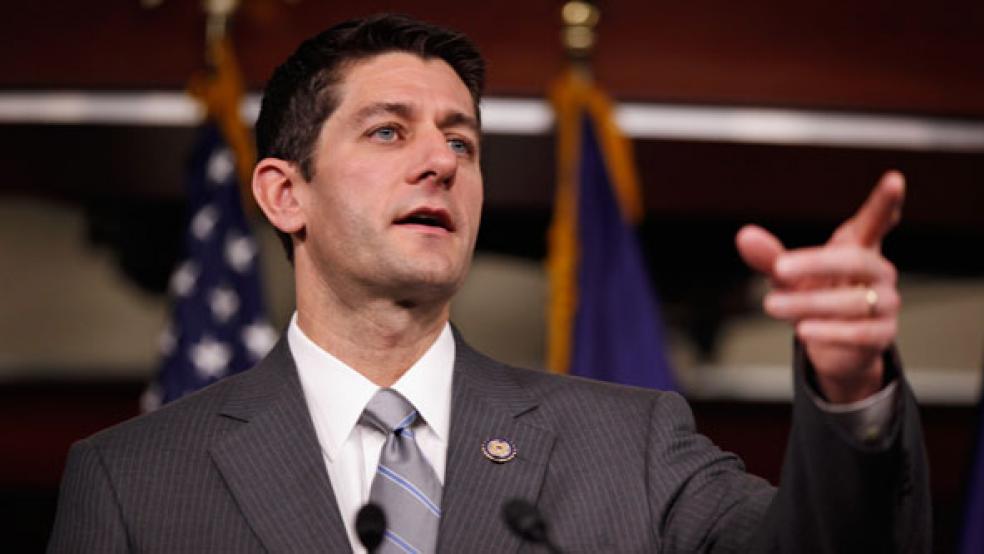The House of Representatives on Thursday approved a controversial budget proposal put forward by Budget Committee Chairman Rep. Paul Ryan (R-WI) by a vote of 219-205, with all but a dozen Republicans voting in favor and Democrats unanimously opposed.
While the vote looks like a win for Ryan and the House leadership, both parties can count the result as a partial victory. For Republicans, the passage of the budget bill through the House marks the end of the bill’s travels through Congress. Senate Democrats will not take up the House bill, and in fact, are not planning to introduce a budget at all this year, citing a two-year budget agreement reached earlier this year that has already set spending for fiscal 2015. What the Democrats get is the opportunity to hang the unpopular elements of the plan on every Republican running for office in the mid-term elections.
Related: Ryan Forges Ahead with Balanced Budget Plan
Though they spoke forcefully against the Ryan budget, House Democrats are, no doubt, privately pleased that nearly the entire Republican conference is on the record supporting a measure that would bump up defense spending by hundreds of billions of dollars over the next decade while simultaneously cutting the funding available for virtually everything else the federal government does, including Medicare, Medicaid, and a host of programs that support the poor.
The budget eliminates the federal deficit within 10 years through proposals that Ryan says would cut more than $5 trillion in spending over a decade. The single biggest cost savings that Ryan identifies is $2.1 trillion from the complete repeal of the Affordable Care Act.
In remarks delivered before the vote, Ryan criticized a competing Democratic proposal as “paternalistic, arrogant, and downright condescending.” He said the Republican plan offers, “a balanced budget that pays down the debt. We are offering patient-centered solutions, so that patients are the nucleus of the health-care system, not the government. We’re offering a plan to save Medicare now and for future generations. We’re offering a stronger safety net with state flexibility, to help meet people’s needs and to help people get from welfare to work to make the most of their lives. We’re offering a pro-growth tax code. We’re offering more energy jobs.
Democrats, predictably, held a starkly different view.
“With today’s vote, House Republicans have unequivocally declared their agenda – rigging the rules for wealthy special interests at the expense of everyone else,” said Rep. Chris Van Hollen (D-MD), the ranking Democrat on the House Budget Committee. “To fund additional tax breaks for the wealthy, the GOP wants to cut jobs, gut funding for education and research, and end the current Medicare guarantee. Instead of expanding and supporting the middle class, they make the clear choice to dismantle the ladder of opportunity – it is a deeply pessimistic view of our nation. American families deserve and demand better.”
Related: Democrats Try to Ride Ryan’s Budget to Victory
Senior Democratic staff on Capitol Hill confirmed that Democratic members of Congress and candidates running to unseat incumbent Republicans expect to use support for the Ryan budget as a weapon on the campaign trail. Some said it would likely be an issue in Senate races as well, if only because Democrats will argue that it shows what the priorities of the Republicans would be if they controlled both chambers of the House.
But Republicans argued that that the budget vote will do Democrats little good with voters.
“Two years ago, House Democrats called this budget their ‘majority maker,’ yet the GOP emerged with one of their largest majorities since the Roosevelt Administration,” said Matt Gorman, a spokesman for the National Republican Congressional Committee. He said the real issue in the Fall will be the Affordable Care Act. “Democrats’ tough talk can’t distract voters from their failed law that has canceled plans and forced families to pay higher premiums,” he said.
Top Reads from The Fiscal Times





